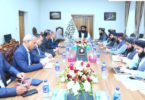Monitoring Desk
PARAKH: The escape of a Russian company and criticism over the new company has prolonged construction work on the Panjshir Dam while some officials of the Energy and Water Ministry face corruption allegations in the project at the Attorney General Office. The Russian company, which for the first time inked the contract, is missing from the Ministry of Energy and Water (MoEW) papers because no guarantee letter is available.
The new company Inter Global Middle East, which is a Ukrainian firm, has also stopped work on the dam and refuses to install the turbines imported by the Russian Company for being not capable to be installed. According to Pajhwok, work on the Panjshir Dam, which was launched by the Russian Company in 2007, should have been completed in one year and eight months but the dam is still incomplete.
Project Contract: The dam is being constructed on the Panjshir River in Paranda valley. According to MoEW, the pipeline of the dam is 2,200 metres on which two turbines with the capacity of producing two megawatts of electricity each will be installed. Eng. Shah Mohammad Nikzad, the project monitor, said the ministry inked a $5.7 million contract with the Russian Company in 2007 and the dam project was expected to be completed in 20 months.
Company is missing: Nikzad said the Russian company had fled after completing 36 percent work on the dam and spending $3.6 million. He said the company had been unable to continue with the work and left the project incomplete and the MoEW has been unable to find the firm. Regarding non-existence of a guarantee, Nikzad said at the time when the contract was signed with the Russian Company acquiring a guarantee letter was not the trend.
The New Contract with same price: According to Nikzad, the MoEW for a second time in 2013 inked the same contract with Intra-Global Middle East Company at a cost of $5.6 million. About the 36 percent work done on the project and the little difference in the first and second contract, Nikzad said: “For the new company, it is a new contract, and therefore there is no difference between the two contracts from the amount perspective,” he said.
Turbines not capable of use: The monitoring officer of the project said the Urkranian company has completed 90 percent work of the dam in almost a year but they have not installed the turbines saying they were not capable of use. But Mohammad Alam Azidyar, a lawmaker from Panjshir and deputy chairman of senate, said the company currently working on the project was trying to escape and did not want to complete the dam project.
He said the company was seeking another $1.9 million from the ministry and the ministry was not willing to provide the amount thus the project is at half-way stage. But Mohammad Qavi, legal advisor of the company, accused the ministry of delaying the work on the project. “We have completed our work and waiting for the MoEW to repair the two turbines and hand them over to us,” he said.
Claims of embezzlement in MWE: Ahmadi said: “Embezzlement in the project had happened in the past, they bought machines but without documents. Not even one page document was presented, the turbines and generators are without documents, we have repeatedly asked the ministry to present turbine’s documents for their installation, but they did not present any.” “They tell us to install some four old metals (turbines), we do not install them because they are burnt, our engineers have checked them, they are useless and burnt, if our company install them, it would damage our reputation, because the turbines cannot produce energy,” he said.
Ahmadi said the ministry had previously told the Intra-Global Middle East Company that the turbines and generators had no problem. He said the company had also suggested to the ministry to provide $9 million for purchasing new turbines and generators but the ministry had rejected the request.
“The ministry officials are involved, if they provide new machineries, the old ones would remain with them, they also have a case in the Anti-Corruption Justice Center (ACJC) and that is the reason our work is delayed,” he added. Ahmadi said the ministry had not cleared one million US dollars it owed to the company.
Nikzad confirmed documents of turbines and generators had been taken along by the previous company. “The Intra-Global Middle East company has said they accept the contract with current conditions and the company itself would pay for shortcomings.” “The turbines can produce four megawatts electricity, but unfortunately the second company makes excuses that the turbines are old or they have no documents.” He said the MEW and Da Afghanistan Breshna Sherkat (DABS) had checked the turbines and the generators and they had reported the machines were partially active and could be used.
“If it is proved the turbines are not working, we will suggest to the president to purchase new ones,” he added, saying the issue was also under review in the National Procurement Commission. The Presidential Palace website says that the issue was discussed by the NPC on July 30, 2017.
Mohammad Ramin Ayaz, NPC spokesman, said the MEW and the president’s counseling department in infrastructural affairs had been tasked to comprehensively investigate the issue and find who had committed negligence in order to face justice. “The technical and legal investigation of the issue is still with the two organs, they would determine whether the machines are usable or not, once the investigation is completed, the report would be shared with the NPC and the NCP would then decide about the project,” he said.
Nikzad, about the cases of some MEW officers at ACJC, said the officials had been found innocent for the lack of evidence to prove their involvement in embezzlement. Jamshid Rasouli, spokesman of Attorney General Office, said the Paranda Dam case had been shared with ACJC in 2017 and three MEW officials had been accused. He said it was beyond ACJC authority to follow the dam case, therefore it was referred to the AGO on December 10, 2017.
Rasouli promised to share more details about the issue with Pajhwok Afghan News, but a contact could not be established with Rasouli for a second time to seek more details. The project has been in the doldrums since a decade while local officials say it can provide electricity to 6,000 families when completed. Some residents of Panjshir use personal resources such as solar panels and mini hydro power generators for producing electricity while others use liquefied gas for lighting their houses.






